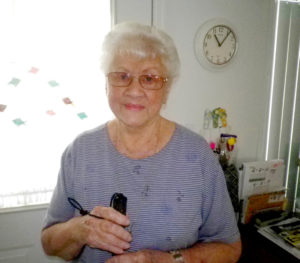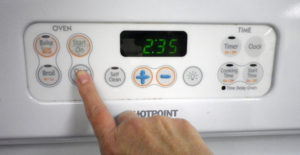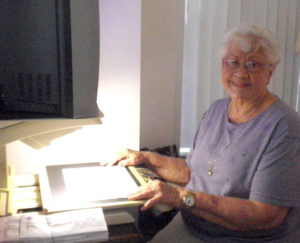 With training and encouragement from staff and other clients, Benny learned how to care for herself and her home, independently.
With training and encouragement from staff and other clients, Benny learned how to care for herself and her home, independently.
Benny is an 85-year-old woman living alone in East Pasco who began losing her vision 5 years ago. She first noticed her vision loss when her window blinds looked jagged, meaning she was not seeing them properly. Then she began having problems driving, and when she could no longer see stop signs or distinguish the red lights from green, she gave up driving–something that is very hard on an independent person. By 2013, Benny had become legally blind due to Macular Degeneration. Macular Degeneration is progressive vision loss that causes the deterioration of the central field of vision used for activities such as reading, seeing faces, and cooking. Benny says that on the day of her diagnosis, she was devastated, angry, frustrated, and she locked herself up in her home and cried. Four days later, she pulled herself together, and called the Lighthouse.
 Appliance panels can be made accessible for people with low vision by using large print, color contrast, and tactile markings.
Appliance panels can be made accessible for people with low vision by using large print, color contrast, and tactile markings.
Benny participated in our Independent Living Skills Program for visually impaired adults and seniors. With training and encouragement from staff and other clients, she learned how to independently care for herself and her home. Her training included learning how to label and manage her medications, how to identify bills and coins, and a Lighthouse instructor came to her home to label her stove, microwave and washer/dryer so she could use them again. Benny says she had to learn to do a lot by touch, in addition to maximizing her remaining vision.
 When Benny heard about the CCTV (video magnification),
When Benny heard about the CCTV (video magnification),
she said, “I’ve got to get me one of these things!”
One of Benny’s real frustrations was reading. Because of vision loss, she had to wait for people to read her mail to her, so even her most urgent or private matters had to wait until she had assistance. Then she learned how to use video magnification. After reading a recipe independently for the first time in years, she happily exclaimed, “I’ve got to get me one of these things.” Just recently, Benny received a loaner video magnifier from the Lighthouse that she can use for as long as she needs. She is now able to read whenever she wants, and she can sew on buttons, because the magnification allows her to see. She also didn’t know about talking watches or talking books—she was so relieved to learn about all of these things.
Benny also took lessons in using the white cane. Before training, she had enough peripheral vision to see curbs marked in yellow, but she could not judge the distance of curbs to the road. So she used a technique she called ‘high stepping,’ which was very dangerous because it created a risk of falling due to a loss of balance. Now, with her newly developed white cane skills, she uses her white cane to judge the curb height, drop-offs, and to find obstacles, which enables her to travel safely and independently in her community and in stores.
Lighthouse is also helping Benny arrange for para-transit door-to-door transportation, so she doesn’t have to wait for others to take her to the places she needs to go.
Benny wanted us to share this with you: “You probably don’t know how much your support means. Because of your support, seniors like me are able to live alone, safely and independently.” She says that the Lighthouse has given her hope that she can get better at doing things, and she is now back to doing her favorite things, which include baking for the Women’s Club, cooking for a friend, gardening, and staying in touch and socializing with friends and family. She says having constant involvement with the community gives her life a sense of purpose. The Lighthouse is privileged to provide the Independent Living Skills Programs and training to almost 200 seniors annually through the support of the Florida Division of Blind Services, the United Way, and private donations.